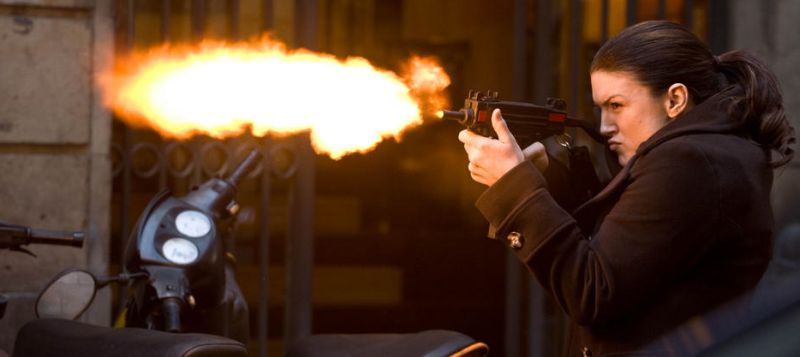 ★★★★½
★★★★½
“First Form at Mallory Towers”
 Soderbergh has never shied away from using unconventional cast members in his movies. Bubble was made entirely with non-professional actors, and when he wanted someone to play a high-class call-girl for The Girlfriend Experience, he went with renowned adult actress, Sasha Grey. Continuing this trend, Haywire revolves around MMA star Carano, which I guess means Soderbergh’s recent leading ladies could, in real life, kick your ass or lick your ass. Ok, I’ll stop. Here, Carano plays Mallory Kane – I keep wanting to type Mallory Knox – an employee of a shady private contracting firm with links to the government, who do the dirty jobs for which the feds want plausible deniability.
Soderbergh has never shied away from using unconventional cast members in his movies. Bubble was made entirely with non-professional actors, and when he wanted someone to play a high-class call-girl for The Girlfriend Experience, he went with renowned adult actress, Sasha Grey. Continuing this trend, Haywire revolves around MMA star Carano, which I guess means Soderbergh’s recent leading ladies could, in real life, kick your ass or lick your ass. Ok, I’ll stop. Here, Carano plays Mallory Kane – I keep wanting to type Mallory Knox – an employee of a shady private contracting firm with links to the government, who do the dirty jobs for which the feds want plausible deniability.
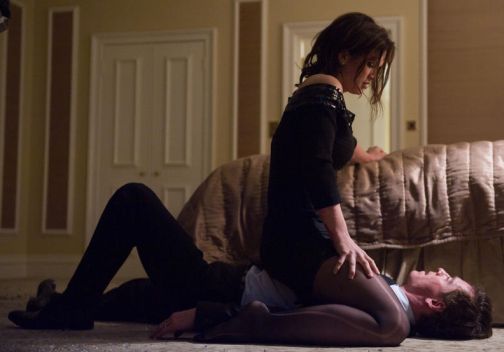 We first meet her in a diner, where Aaron (Tatum) meets her. It’s clear there’s some tension, with Aaron having been ordered to bring her in. After a brief, brutal brawl, she knocks him out and escapes, in a car belonging to startled patron Scott (Angarano). There she reveals what led up to that day: an operation in Barcelona, supposedly to rescue a hostage, followed by another in Dublin, which turned out to be an attempt to tidy up the loose ends from Barcelona, The plan is to frame Kane for multiple murders and portray her as a rogue operative. Kane needs to get to her boss, Kenneth (McGregor), and expose the truth before she’s gunned down.
We first meet her in a diner, where Aaron (Tatum) meets her. It’s clear there’s some tension, with Aaron having been ordered to bring her in. After a brief, brutal brawl, she knocks him out and escapes, in a car belonging to startled patron Scott (Angarano). There she reveals what led up to that day: an operation in Barcelona, supposedly to rescue a hostage, followed by another in Dublin, which turned out to be an attempt to tidy up the loose ends from Barcelona, The plan is to frame Kane for multiple murders and portray her as a rogue operative. Kane needs to get to her boss, Kenneth (McGregor), and expose the truth before she’s gunned down.
It’s a deliberately-vague plot, with the characters speaking in clipped obscurisms, that leave the audience to piece things together. Don’t worry, it all becomes clear by the end, but it is probably fair to say that you have to pay a bit more attention than is usual for this kind of Hollywood thriller, between the fractured timeline and doubtful loyalties of most characters. It’s economical, at a tight 91 minutes (about 22 minutes shorter than the average Jason Bourne movie to date), and much like Carano, there’s not much fat on its bones: every scene serves a distinct purpose, which is definitely the way I like my movies.
I find it hard to criticize Carano’s acting, because it’s not clear how much acting is involved. Mallory Kane does not just possess physical prowess, but one who is also extremely comfortable with using it, and has a quiet confidence in her abilities. Any similarity to Carano is clearly not coincidental, and there isn’t much more required of her, in terms of emotion or depth. Unlike most action heroines there is no “personal” agenda e.g. Sarah Connor in T2, Ellen Ripley in Aliens, or The Bride in Kill Bill, it’s simply a case that her enemies are out to get her. In that aspect, Knox is not a particularly-“feminine” character. Just as Salt was originally envisaged as a male role, it’s easy to imagine someone like Jason Statham playing this part; hardly any plot changes would be needed.
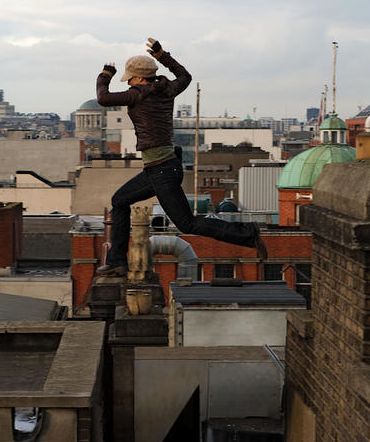 And then there’s the ass-kicking, of various kinds. It’s good, Carano demonstrating a no-nonsense style that’s highly-effective. Perhaps too effective, in fact, since it seems that hardly any of the fights last longer than about 30 seconds – even the hotel bedroom one, which is certainly one of the roughest male/female brawls seen this side of Terminator 3, feels like it ends, just about when it should be getting going. While it’s nice to be left wanting more, rather than less, it’s still not quite the all-you-can-eat buffet of action I wanted. There also is no real sense of escalation; her final battle isn’t particularly different from the one which opens the film, in the diner; it has another location, and that’s about it, there’s no indication her adversary is any more of a challenge.
And then there’s the ass-kicking, of various kinds. It’s good, Carano demonstrating a no-nonsense style that’s highly-effective. Perhaps too effective, in fact, since it seems that hardly any of the fights last longer than about 30 seconds – even the hotel bedroom one, which is certainly one of the roughest male/female brawls seen this side of Terminator 3, feels like it ends, just about when it should be getting going. While it’s nice to be left wanting more, rather than less, it’s still not quite the all-you-can-eat buffet of action I wanted. There also is no real sense of escalation; her final battle isn’t particularly different from the one which opens the film, in the diner; it has another location, and that’s about it, there’s no indication her adversary is any more of a challenge.
While the battles are well crafted – I note that the fight co-ordinator was J.J. Perry, who worked on Sunland Heat back in 2005 – perhaps my favorite scene was not actually one of them, but an extended scene where Mallory has to shake off her pursuers in Dublin. It is adequately extended, contains a number of twists and turns over its length, and showcases Carano’s physical prowess in more than just brutality, as she glides through and over buildings. I also enjoyed a snowy car-chase, which ends in a way which, I’m prepared to bet, you haven’t seen in a movie before. One senses Soderbergh and writer Lem Dobbs enjoyed playing with the usual expectations of the genre.
It’s certainly shot in typical Soderbergh style. He throws all manner of styles in there, from black-and-white through hand-held to the heavy use of colour filters. Mostly, these flourishes enhance the film, rather than distracting from it, and a billion nods of approval are due for avoiding the rapid-cut style of editing, which is the bane of modern action cinema (except for the rare cases where it’s done properly). Still, there’s no question it’s obvious who made it, to the point that I actually laughed when a shot of Kenneth appeared in sepia – having seen Traffic, I knew, before it was explained, that he had to be in Mexico.
All told, if not quite an all-time classic, this is more than acceptable, upper-tier work. Carano is by no means out of her depth, despite a heavyweight supporting cast including the likes of Michael Douglas and Antonio Banderas, and has an understated charisma which works in her favour. I don’t know if her future plans involving returning to the octagon, or sticking with the acting, but if it’s the latter, she’d certainly be a welcome addition to the (fairly short) roster of credible action-heroines from which Hollywood can draw.
Dir: Steven Soderbergh
Star: Gina Carano, Ewan McGregor, Channing Tatum, Michael Angarano
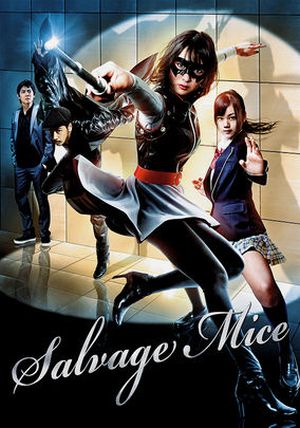 Mai (Tanimura) and her partner (Sato) form a team – the titular rodents – who recover art and artifacts, and return them to their “rightful” owners – quotes used advisedly, it’s vague on the details. However, Mai is betrayed, and framed for the robberies actually being committed by the gang operating under the Evil Western Dude (Heselton, who was also the main villain in Karate Girl). Mai encounters Mio (Nagano), part of ‘Hiroshima Cleans’, a group of volunteers who help keep the city tidy. Initially, Mio thinks Mai is the villain, but is eventually convinced that the real bad guy is elsewhere, and the pair team up to take on the villains, including both Mai’s ex and Evil Western Dude.
Mai (Tanimura) and her partner (Sato) form a team – the titular rodents – who recover art and artifacts, and return them to their “rightful” owners – quotes used advisedly, it’s vague on the details. However, Mai is betrayed, and framed for the robberies actually being committed by the gang operating under the Evil Western Dude (Heselton, who was also the main villain in Karate Girl). Mai encounters Mio (Nagano), part of ‘Hiroshima Cleans’, a group of volunteers who help keep the city tidy. Initially, Mio thinks Mai is the villain, but is eventually convinced that the real bad guy is elsewhere, and the pair team up to take on the villains, including both Mai’s ex and Evil Western Dude.




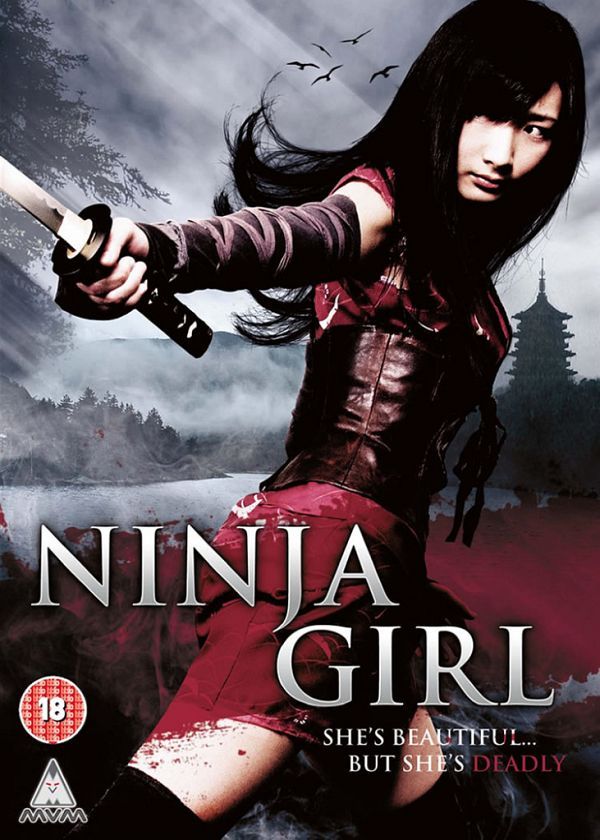 From the director of Alien vs. Ninja, the story here centres on a pair of ninjas, Shimotsuki and Hyotsuki, who are carrying on what appears to be a family tradition, kidnapping women from other clans’ villages, and taking them back to their own for nefarious purposes – let’s just say, the phrase “tools of pleasure” crops up on more than one occasion. They ar returning with their latest batch of four, including Kisaragi (Takeda), who is a ninja in her own right. With the help of a mysterious man (Sato), Kisuragi and her colleagues in imprisonment are released from their bondage – but that is only the first obstacle between them and their freedom. Of course, it turns out the heroine is not quite as innocent as she appears, and has an agenda of her own, because her mother was kidnapped by the same sleazy ninjas, when Kisuragi was just a baby.
From the director of Alien vs. Ninja, the story here centres on a pair of ninjas, Shimotsuki and Hyotsuki, who are carrying on what appears to be a family tradition, kidnapping women from other clans’ villages, and taking them back to their own for nefarious purposes – let’s just say, the phrase “tools of pleasure” crops up on more than one occasion. They ar returning with their latest batch of four, including Kisaragi (Takeda), who is a ninja in her own right. With the help of a mysterious man (Sato), Kisuragi and her colleagues in imprisonment are released from their bondage – but that is only the first obstacle between them and their freedom. Of course, it turns out the heroine is not quite as innocent as she appears, and has an agenda of her own, because her mother was kidnapped by the same sleazy ninjas, when Kisuragi was just a baby.
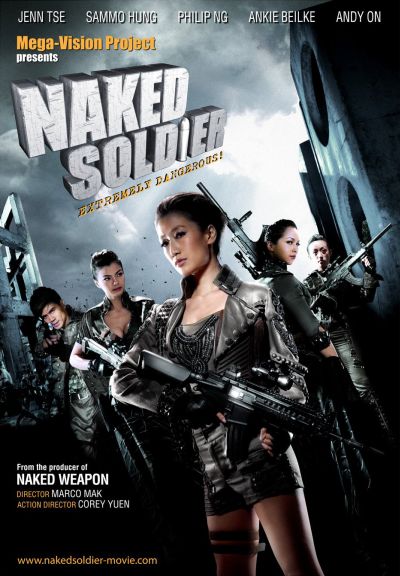 Ten years after Maggie Q got her career as an action heroine kickstarted with Weapon, and twenty after Killer rampaged its way into cult status, Jennifer Tse takes over – bearing more than a passing resemblance to her predecessor, I think. I think it’s kinda cool how the series gets revisited every decade, regular as clockwork: maybe famed producer Wong Jing has a house payment to make or something? Admittedly, there’s not much more than a tangential connection between the entries; three different directors, three different stars, and not much overlap in terms of plot. However, they still share a common approach, fetishising the female form and the act of assassination, with no shortage of style, and are the longest-running (in terms of years) GWG series around.
Ten years after Maggie Q got her career as an action heroine kickstarted with Weapon, and twenty after Killer rampaged its way into cult status, Jennifer Tse takes over – bearing more than a passing resemblance to her predecessor, I think. I think it’s kinda cool how the series gets revisited every decade, regular as clockwork: maybe famed producer Wong Jing has a house payment to make or something? Admittedly, there’s not much more than a tangential connection between the entries; three different directors, three different stars, and not much overlap in terms of plot. However, they still share a common approach, fetishising the female form and the act of assassination, with no shortage of style, and are the longest-running (in terms of years) GWG series around.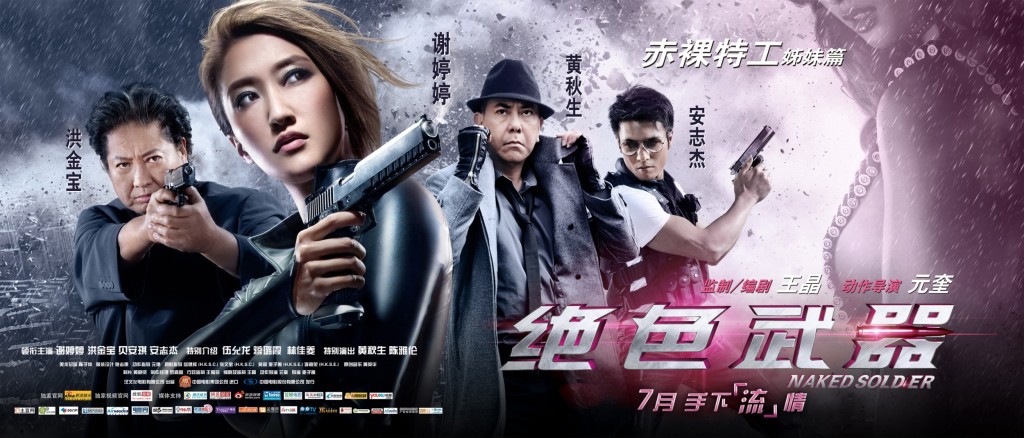
 Despite the name, there isn’t much raging, especially in the first half, which is more about the struggle for ownership of a company. It starts with an attack on the current chairman and his wife Bin (Ng) while on a trip to the Phillippines, after which she takes over the company. That doesn’t last long, as Tammy (Cheung) has designs on its finances, aiming to asset-strip it for his own purposes and divest Bin of her shareholding. To this end, he frames her and Chin (Leung), her best friend who is the wife of the company’s accountant, for drug smuggling: Chin takes the rap and is sent to 10 years jail. It takes all Bin’s resources to get her out, and when he does, Tammy sends his henchmen to kill their mother [ok, its not clear
Despite the name, there isn’t much raging, especially in the first half, which is more about the struggle for ownership of a company. It starts with an attack on the current chairman and his wife Bin (Ng) while on a trip to the Phillippines, after which she takes over the company. That doesn’t last long, as Tammy (Cheung) has designs on its finances, aiming to asset-strip it for his own purposes and divest Bin of her shareholding. To this end, he frames her and Chin (Leung), her best friend who is the wife of the company’s accountant, for drug smuggling: Chin takes the rap and is sent to 10 years jail. It takes all Bin’s resources to get her out, and when he does, Tammy sends his henchmen to kill their mother [ok, its not clear  The film manages to cram just about every cliché of martial-arts films into its 92 minutes, with a plot driven by four major threads:
The film manages to cram just about every cliché of martial-arts films into its 92 minutes, with a plot driven by four major threads: The entertainment value you get from this may depend on your expectations. It undoubtedly works best as a party-tape, show-casing the “no wires, CGI or stunt doubles” approach, but I have to beg to differ with some of the critical savaging it has received. Even
The entertainment value you get from this may depend on your expectations. It undoubtedly works best as a party-tape, show-casing the “no wires, CGI or stunt doubles” approach, but I have to beg to differ with some of the critical savaging it has received. Even  Last month, we saw MMA star Gina Carano hit the big-screen in Haywire, but she’s not the first genuine female martial-artist to have started a movie career. Most obviously, Cynthia Rothtock was a five-time World Karate Champion in forms and weapons, and has a number of black belts in various disciplines. Similarly, Jeeja Yanin was a third-Dan black belt in Taekwondo, before hitting the silver screen in Chocolat. But here, we’ll be looking at the name that has recently emerged out of Japan, Rina Takeda, holder of a black belt in Ryukyu Shorin-ryu Karate.
Last month, we saw MMA star Gina Carano hit the big-screen in Haywire, but she’s not the first genuine female martial-artist to have started a movie career. Most obviously, Cynthia Rothtock was a five-time World Karate Champion in forms and weapons, and has a number of black belts in various disciplines. Similarly, Jeeja Yanin was a third-Dan black belt in Taekwondo, before hitting the silver screen in Chocolat. But here, we’ll be looking at the name that has recently emerged out of Japan, Rina Takeda, holder of a black belt in Ryukyu Shorin-ryu Karate. ★★★★½
★★★★½ We first meet her in a diner, where Aaron (Tatum) meets her. It’s clear there’s some tension, with Aaron having been ordered to bring her in. After a brief, brutal brawl, she knocks him out and escapes, in a car belonging to startled patron Scott (Angarano). There she reveals what led up to that day: an operation in Barcelona, supposedly to rescue a hostage, followed by another in Dublin, which turned out to be an attempt to tidy up the loose ends from Barcelona, The plan is to frame Kane for multiple murders and portray her as a rogue operative. Kane needs to get to her boss, Kenneth (McGregor), and expose the truth before she’s gunned down.
We first meet her in a diner, where Aaron (Tatum) meets her. It’s clear there’s some tension, with Aaron having been ordered to bring her in. After a brief, brutal brawl, she knocks him out and escapes, in a car belonging to startled patron Scott (Angarano). There she reveals what led up to that day: an operation in Barcelona, supposedly to rescue a hostage, followed by another in Dublin, which turned out to be an attempt to tidy up the loose ends from Barcelona, The plan is to frame Kane for multiple murders and portray her as a rogue operative. Kane needs to get to her boss, Kenneth (McGregor), and expose the truth before she’s gunned down. And then there’s the ass-kicking, of various kinds. It’s good, Carano demonstrating a no-nonsense style that’s highly-effective. Perhaps
And then there’s the ass-kicking, of various kinds. It’s good, Carano demonstrating a no-nonsense style that’s highly-effective. Perhaps 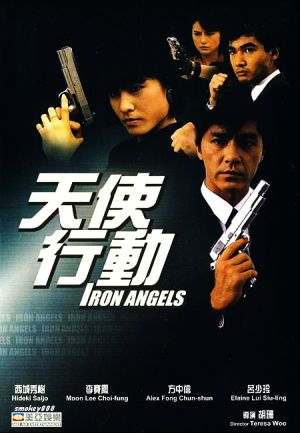 This and Yes, Madam were basically the Genesis and Exodus of the genre as we know it. Sure, there had been action heroines before, but never with quite the heft of their male counterparts. Madam showed they could kick ass with the best of them; Angel took this, and added about a billion bullets to the mix. Sure, it’s rough around the edges, with scenes that appear randomly inserted and characters so shallow they resemble a puddle. But its influence was massive, and if you can watch the final battle without wincing, as Lee and Oshima kick the utter crap out of each other, you’re made of tougher stuff than I [It’s the December 2011 video of the month].
This and Yes, Madam were basically the Genesis and Exodus of the genre as we know it. Sure, there had been action heroines before, but never with quite the heft of their male counterparts. Madam showed they could kick ass with the best of them; Angel took this, and added about a billion bullets to the mix. Sure, it’s rough around the edges, with scenes that appear randomly inserted and characters so shallow they resemble a puddle. But its influence was massive, and if you can watch the final battle without wincing, as Lee and Oshima kick the utter crap out of each other, you’re made of tougher stuff than I [It’s the December 2011 video of the month].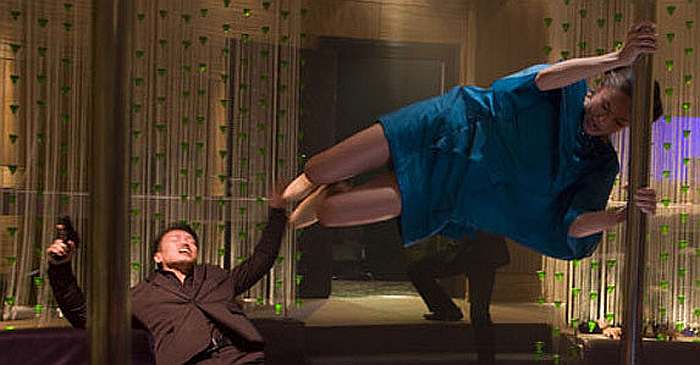 ★½
★½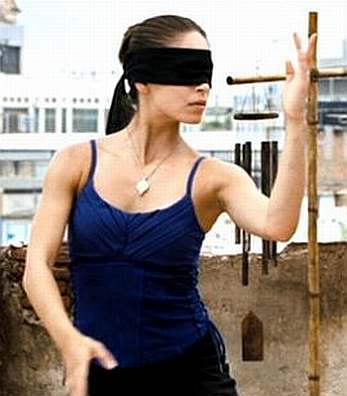 I usually have no problem going on about GWG movies at some length. Hell, I even managed 750 words on DOA: Dead or Alive, and for that one, I had to re-read my review to remember what it was about. But when I got to the end of Street Fighter: The Legend of Chun-Li, my first thought was, “What the hell am I going to write about this?” It seemed likely the only way I’d get to 750 words, would be by repeating the title one hundred and twenty-five times. For the film is ill-conceived, poorly cast, badly written and directed by the man who managed to make Jet Li look bad, not once but twice, in Romeo Must Die and Cradle 2 the Grave.
I usually have no problem going on about GWG movies at some length. Hell, I even managed 750 words on DOA: Dead or Alive, and for that one, I had to re-read my review to remember what it was about. But when I got to the end of Street Fighter: The Legend of Chun-Li, my first thought was, “What the hell am I going to write about this?” It seemed likely the only way I’d get to 750 words, would be by repeating the title one hundred and twenty-five times. For the film is ill-conceived, poorly cast, badly written and directed by the man who managed to make Jet Li look bad, not once but twice, in Romeo Must Die and Cradle 2 the Grave. And I believed Street Fighter II was a fighting game. Silly me. It’s far too talky: all mouth and no trousers, to borrow a good ol’ British phrase. The fights themselves, choreographed by Dion Lam, aren’t bad, though the welding of some of the Street Fighter moves into the game doesn’t work – Chun-Li’s Spinning Bird Kick, for example, just looks silly. But otherwise, they aren’t awful; there’s a nice brawl in a bathroom between our heroine and Bison’s henchwomen. However, particularly in the first hour, there just aren’t enough of them, and what should be a fast-paced slugfest becomes bogged down as Chun-Li meanders her way, with a somewhat concerned expression, around the slums of Bangkok [which actually look surprisingly liveable. You want real slums, try Mumbai].
And I believed Street Fighter II was a fighting game. Silly me. It’s far too talky: all mouth and no trousers, to borrow a good ol’ British phrase. The fights themselves, choreographed by Dion Lam, aren’t bad, though the welding of some of the Street Fighter moves into the game doesn’t work – Chun-Li’s Spinning Bird Kick, for example, just looks silly. But otherwise, they aren’t awful; there’s a nice brawl in a bathroom between our heroine and Bison’s henchwomen. However, particularly in the first hour, there just aren’t enough of them, and what should be a fast-paced slugfest becomes bogged down as Chun-Li meanders her way, with a somewhat concerned expression, around the slums of Bangkok [which actually look surprisingly liveable. You want real slums, try Mumbai].